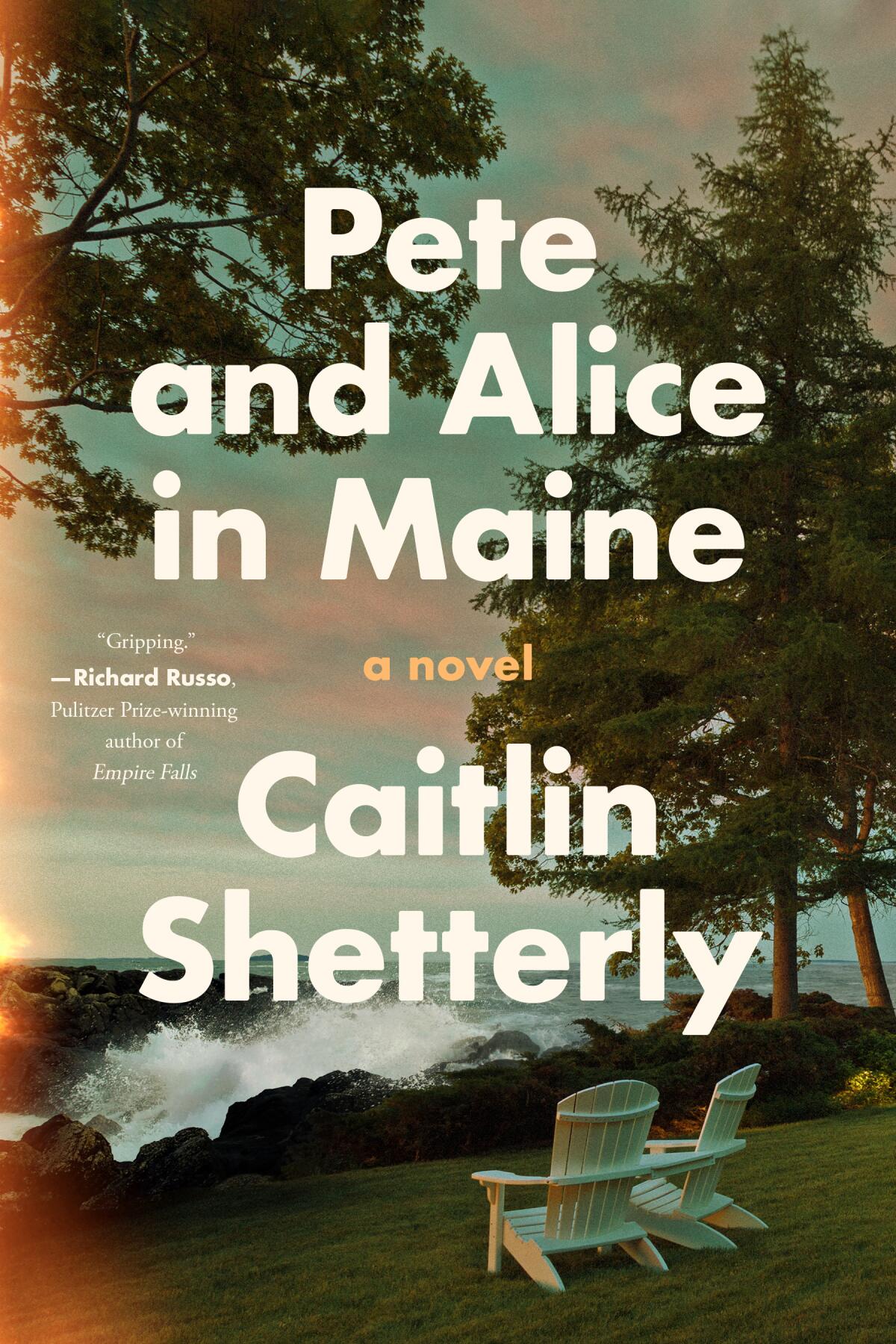A new novel nails one kind of COVID experience. We still wait for the other 99%

- Share via
Review
Pete and Alice in Maine
By Caitlin Shetterly
Harper: 256 pages, $29
If you buy books linked on our site, The Times may earn a commission from Bookshop.org, whose fees support independent bookstores.
Near the twisty end of “Pete and Alice in Maine,” the first novel by environmental writer and theater director Caitlin Shetterly, Alice sums up the lessons of her first pandemic year: “Being a family, we’re always coming in and then going back out like the tide. The real question is, can you bear the times in between?”
When we meet Alice, she cannot bear any of it. It’s winter 2020. She lives with her financier husband, Pete, and their two tween daughters in New York City, where sirens are incessantly wailing and bodies piling up in FEMA refrigerated trucks. In Maine, where Alice and Pete own a seaside summer cottage, COVID-19 doesn’t (yet) exist. With classic liberal guilt, Alice acknowledges the rarefied nature of her family’s COVID experience — and thereby, the book’s limited focus on the tiny portion of the U.S. population whose resources shielded them from much of the virus’ devastation. “We can leave,” Alice tells Pete. “Our privilege is clear, almost criminal,” she thinks. “We don’t need personal protective equipment; no one is counting on us to save their lives. We must only save our own.”
Oh, and Alice has another reason for fleeing. “This way my husband can’t leave me.”
“I still have my job,” Pete protests. “The job that makes our money and is the thing,” Alice thinks, “...ever since he began the other thing.”
Over the last three months, 17 writers provided diaries to the Times of their days in isolation, followed by weeks of protest. This is their story.
Finally, reluctantly, Pete gets on the bus (metaphorically of course; they drive). His company accepts his seemingly radical proposal to work from home. “Did he tell The Her he was going?” Alice wonders. “Did he say goodbye?” Finally, the precipitating event of the novel is named. Alice has recently discovered that Pete has been having a years-long affair with the unnamed Her.
In chapters told from alternating points of view — Alice’s predominates in first person, while Pete and the girls are heard from in quieter third-person — the family’s year of living dangerously unfolds slowly, yet compellingly.

If you remember 2020, and who doesn’t, you’ll recall the time warp, the blur of days, weeks, months folding indistinguishably into each other, each day’s goals the same for humans across the globe. One, don’t die. Two, don’t lose whatever and whomever you had when lockdowns began. What we see from the distance of the novel and its fundamentally earnest protagonists is that despite the boredom, fear, loneliness and despair the pandemic wrought, it also brought the potential to become the only thing we have to look forward to: the better, happier humans we aspire to be.
As in real-life 2020, nothing much happens on the outside. Ingmar, the beloved cat and super glue of the family, goes missing. A shark kills a swimmer down the coast. In the most idyllic of settings, an adventurous child nearly drowns. A different nosy child reads a diary she’ll wish, for the rest of her life, she hadn’t found. Unapologetic locals sabotage the invading “New Yawkas’” access to their most basic needs.
T.C. Boyle, Viet Than Nguyen, Rachel Kushner, Carribean Fragoza, Tom Perrotta, Charles Yu, Michelle Tea, Dana Johnson, Luis J. Rodriguez on their pandemic years.
Most of the action takes place in the characters’ heads. Should Alice divorce her handsome, philandering, high-earning, devoted father of a husband? Should Pete make a break for it, give up on attaining his wounded wife’s forgiveness and find a plausible excuse to return to New York, where the comforts of money and lust await? Can Iris and Sophie forgive each other for being sisters, not the same-age friends they both need?
I loved reading this book, which I gulped down in two otherwise busy days. I resisted and also relished its bizarro details of the day the world ground to a halt. Alice’s triple-masked grocery runs surfaced other, stranger pandemic memories. Quarantining the mail. Circles chalked onto public lawns to maintain six feet of distance. Chapped, bleeding hands banned from touching other chapped, bleeding hands. Hiking without touching a trail railing or a water fountain … and then, not hiking at all.
Some obvious pandemic markers are strangely absent from the narrative. We don’t see a single episode of a cold or a cough triggering the debilitating terror — justified or not — of that pre-vaccine era. Then-President Trump gets COVID in the novel, yet not one of the book’s characters takes a test or gets sick. While Alice is as “woke” as a hedge fund manager’s frustrated wife can realistically be, reflecting often on her privileged position, she seems to experience little or no empathy for the 99% who suffer so much more than she does, even with her achy-breaky heart.
Kevin Powers was among the best in a wave of novelists on Iraq and Afghanistan. His new thriller, “A Line in the Sand,” signals their slow fade from relevance.
Before reading “Pete and Alice,” I was surprised by the dearth of pandemic novels — 9/11 yielded far more. I theorized that maybe we don’t need them, because who wants to remember, and who could ever forget? Then yesterday, in advance of visits to my 94-year-old mother and a pregnant friend, I started feeling fluish. I couldn’t remember where I’d stashed my stack of home tests, which proved to be expired, and which yielded a positive result. Rushing to my doctor in an old-fashioned COVID panic, I tested negative twice. Hugely relieved, I asked for a fresh batch of free tests for the next time(s). My doctor said Medicare wasn’t giving out home tests anymore. “Apparently COVID is over,” he said.
Of course, it’s not. COVID’s effects, past, present and future, will always be with us — and especially with the less fortunate among us. While I appreciate the author’s rendering of the psychological trauma inflicted by the pandemic even on the wealthy, “Pete and Alice in Maine” left me longing to read the pandemic stories of the rest of the population.
Maran lives in L.A. and is the author of “The New Old Me” and a dozen other books.
More to Read
Sign up for our Book Club newsletter
Get the latest news, events and more from the Los Angeles Times Book Club, and help us get L.A. reading and talking.
You may occasionally receive promotional content from the Los Angeles Times.










